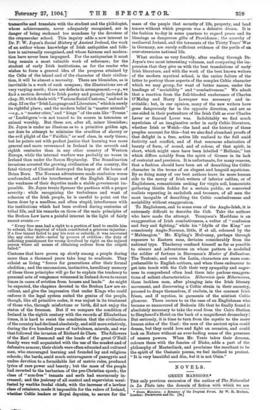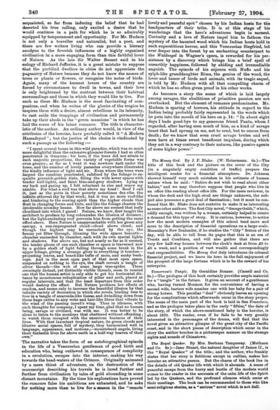THE only previous excursion of the author of The Naturalist
in La Plata into the domain of fiction with which we are • Green Mansions to Romance of the Tropical Forest. .B1 W. H. Hudaou. London: Duckworth and Co. [64.] acquainted, so far from inducing the belief that he had deserted his true calling, only excited a desire that he would continue in a path for which he is so admirably equipped by temperament and opportunity. For Mr. Hudson is not only a traveller and naturalist, but a poet, and there are few writers living who can provide a literary anodyne to the feverish influences of a highly organised civilisation in a more engaging form than this faithful lover of Nature. As the late Sir Walter Besant said in his eulogy of Richard Jefferies, it is a great mistake to suppose that the purblind dwellers in cities do not appreciate the pageantry of Nature because they do not know the names of trees or plants or flowers, or recognise the notes of birds. Again, many of the keenest lovers of the country are forced by circumstance to dwell in towns, and their love is only heightened by the contrast between their habitual surroundings and those in which they would like to live. For such as these Mr. Hudson is the most fascinating of com- panions, and when he writes of the glories of the tropics he inspires them with a desire, almost rebellious in its intensity, to cast aside the trappings of civilisation and permanently take up their abode in the green mansions" in which he has laid the scene of his latest romance. The title is character- istic of the author. An ordinary author would, in view of the attributes of the heroine, have probably called it "A Modern Hamadryad "; but the justice of the choice is vindicated by such a passage as the following :— "I spent several hours in this wild paradise, which was so much =ore delightful than the extensive gloomier forests I had so often penetrated in Guayana : for here, if the trees did not attain to such majestic proportions, the variety of vegetable forms was even greater; as far as I went it was nowhere dark under the trees, and the number of lovely parasites everywhere illustrated the kindly influence of light and air. Even where the trees were largest the sunshine penetrated, subdued by the foliage to ex- quisite greenish-golden tints, filling the wide lower spaces with tender half-lights, and faint blue-and-grey shadows. Lying on ray back and gazing up, I felt reluctant to rise and renew my ramble. For what a roof was that above my head ! Roof I call it, just as the poets in their poverty sometimes describe the infinite ethereal sky by that word ; but it was no more roof-like and hindering to the soaring spirit than the higher clouds that float in changing forms and tints, and like the foliage chasten the intolerable noonday beams. How far above me seemed that leafy oloudland into which I gazed ! Nature, we know, first taught the .architect to produce by long colonnades the illusion of distance ; but the light-excluding roof prevents him from getting the same effect above. Here Nature is unapproachable with her green airy canopy, a sun-impregnated cloud—cloud above cloud ; and though the highest may be unreached by the eye, the beams yet filter through, illuming the wide spaces beneath— 'chamber succeeded by chamber, each with its own special lights and shadows. Far above me, but not nearly so far as it seemed, the tender gloom of one such chamber or space is traversed now by a golden shaft of light falling through some break in the upper foliage, giving a strange glory to everything it touches— projecting leaves, and beard-like tufts of moss, and snaky bush- rope. And in the most open part of that most open space, suspended on nothing to the eye, the shaft reveals a tangle of silver threads—the web of some large tree-spider. These seemingly distant, yet distinctly visible threads, seem to remind one that the human artist is only able to get his horizontal dis- tance by monotonous reduplication of pillar and arch, placed at regular intervals, and that the least departure from this order would destroy the effect. But Nature produces her effects at random, and seems only to increase the beautiful illusion by that infinite variety of decoration in which she revels, binding tree to tree in a tangle of anaconda-like lianas, and dwindling down from these huge cables to airy webs and hair-like fibres that vibrate to the wind of the passing insect's wing. Thus in idleness, with such thoughts for company, I spent my time, glad that no human being, savage or civilised, was with me. It was better to be alone to listen to the monkeys that chattered without offending ; to watch them occupied with the nnserious business of their lives. With that luxuriant tropical nature, its green clouds and illusive aerial spaces, full of mystery, they harmonised well in language, appearance, and motions ;—mountebank angels, living their fantastic lives far above earth in a half-way heaven of their own."
'The narrative takes the form of an autobiographical episode in the life of a Venezuelan gentleman of good birth and education who, being outlawed in consequence of complicity in a revolution, escapes into the interior, making his way towards the head-waters of the Orinoco. Originally animated by a mere thirst of adventure, on the destruction of the manuscript describing his travels he is lured further and further from civilisation by tales of gold abounding in some 'distant mountains. By the time his explorations have proved the rumours false his ambitions are exhausted, and he asks for nothing more than to live for a season in the "remote
lovely and peaceful spot" chosen by his Indian hosts for the headquarters of their tribe. It is at this stage of his wanderings that the hero's adventures begin in earnest. Curiosity and a love of Nature impel him to fathom the mystery of the haunted wood which his Indian hosts hold in such superstitious horror, and this Venezuelan Siegfried, led ever deeper into the forest by an enchanting counterpart to the Waldvogel in Wagner's opera, is rewarded for his per- sistence by a discovery which brings him a brief spell of unearthly happiness, followed by abiding and irremediable anguish. The episode of his sojourn with Null° and his sylph-like granddaughter Rima, the genius of the wood, the lover and tamer of birds and animals, with its tragic sequel, is told by Mr. Hudson with all that compelling charm of which he has so often given proof in his other works.
As becomes a story the scene of which is laid largely among savages, the ebullitions of primitive passion are not overlooked. But the element of romance predominates. Mr. Hudson is sparing of horrors, his attitude in regard to the Indian being probably fairly represented in the words which he puts into the mouth of his hero on p. 14: "In about eight days I bade good-bye to my generous friend Panta, whom I regarded, after having seen much of him, as a kind of savage beast that had sprung on me, not to rend, but to rescue from death ; for we know that even cruel savage brutes and evil men have at times sweet beneficent impulses, during which they act in a way contrary to their natures, like passive agents of some higher power."











































 Previous page
Previous page